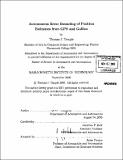Autonomous error bounding of position estimates from GPS and Galileo
Author(s)
Temple, Thomas J. (Thomas John)
DownloadFull printable version (10.81Mb)
Other Contributors
Massachusetts Institute of Technology. Dept. of Aeronautics and Astronautics.
Advisor
Jonathan P. How.
Terms of use
Metadata
Show full item recordAbstract
In safety-of-life applications of satellite-based navigation, such as the guided approach and landing of an aircraft, the most important question is whether the navigation error is tolerable. Although differentially corrected GPS is accurate enough for the task most of the time, anomalous measurement errors can create situations where the navigation error is intolerably large. Detection of such situations is referred to as integrity monitoring. Due to the non:stationary nature of the error sources, it is impossible to predetermine an adequate error-bound with the required confidence. Since the errors at the airplane can be different from the errors at reference stations, integrity can't be assured by ground monitoring. It is therefore necessary for the receiver on the airplane to autonomously assess the integrity of the position estimate in real-time. In the presence of multiple errors it is possible for a set of measurements to remain self-consistent despite containing errors. This is the primary reason why GPS has been unable to provide adequate integrity for aircraft approach. When the Galileo system become operational, there will be many more independent measurements. The more measurements that are available, the more unlikely it becomes that the errors happen to be self-consistent by chance. This thesis will quantify this relationship. (CONT.) In particular, we determine the maximum level of navigation error at a given probability as a function of the redundancy and consistency of the measurements. Rather than approach this problem with statistical tests in mind, we approach this as a machine learning problem in which we empirically determine an optimal mapping from the measurements to an error bound. In so doing we will examine a broader class of tests than has been considered before. With a sufficiently large and demanding training data, this approach provides error-bounding functions that meet even the strictest integrity requirements of precision approaches. We determine the optimal error-bounding function and show that in a GPS + Galileo constellation, it can meet the requirements of Category I, II and III precision approach-a feat that has proven difficult for GPS alone. This function is shown to underestimate the level of error at a rate of less than 10-7 per snapshot regardless of the pseudorange error distribution. This corresponds to a rate of missed detection of less than 10-9 for all approach categorizations. At the same time, in a 54 satellite constellation, the level of availability for Category I precision approaches availability exceeds 99.999%. For Category II and III precision approaches, it can provide availability exceeding 99.9% with either a 60 satellite constellation, or with a modest improvement over existing LAAS corrections.
Description
Thesis (S.M.)--Massachusetts Institute of Technology, Dept. of Aeronautics and Astronautics, 2006. Includes bibliographical references (p. 79-81).
Date issued
2006Department
Massachusetts Institute of Technology. Department of Aeronautics and AstronauticsPublisher
Massachusetts Institute of Technology
Keywords
Aeronautics and Astronautics.